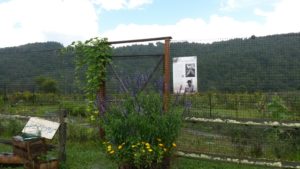The title quote comes from Matthew Desmond in his book Evicted: Poverty and Profit in the American City, and the broader context of that line is this:
If the poor pay more for their housing, food, durable goods, and credit, and if they get smaller returns on their educations and mortgages (if they get returns at all), then their incomes are even smaller than they appear. This is fundamentally unfair.
Though the subject of that must-read book is based on the author’s immersion in Milwaukee, the quote above provides insight as to why we have a garden at Hospitality House. We happen to serve the region in the state that has the second-highest homeless rate in the state at 19% [homeless rate is determined by the number of homeless persons per 10,000 population]. To complicate the issue, there are three unsheltered individuals for each person sheltered, and with 65% of our unsheltered population being families, we are paddling upstream while taking on water. One of our residents, who before entering our program had lost her home due to her husband’s work injury and were getting by via camping in the woods, described the trials of homelessness quite plainly:
I was pregnant getting jugs of water from the mountain stream so that we could shower, wash clothes and even cook with when needed. This is just the water. If you want to stay at a “free campsite” be prepared to travel 30-45 min away just to go to the grocery store and when you get there you will only be able to buy non-perishable food unless you can eat it that day. I craved fresh fruit and vegetables the most during these days.
Our primary goal of the garden is to supplement the produce in our kitchen and pantry programs. Secondarily, as documented on this blog, we want to build capacity in current residents, former residents, and low-wealth households in the community to grow their own produce. It is slightly ironic to consider homelessness and gardening on this day, the anniversary of Abraham Lincoln signing the Homestead Act. The challenge we find in recruiting residents in our shelter and housing program lies squarely in the mindset they have developed through surviving. Please do not misunderstand the homeless population: they are extremely resourceful, as is the case for most individuals living in poverty. The mindset of someone without basic shelter and food is to address those immediate needs. A part of the story contained in this Hidden Brain podcast summarizes this resourceful and practically entrepreneurial trait. Additionally, there is an outstanding series done by WNYC’s On the Media that examines poverty realities in their series Busted: America’s Poverty Myths (which features a trip through Athens, OH).
Gardening takes patience and planning but provides valuable stability. Hospitality House has recently been involved in a county-wide effort to be trauma-informed, an endeavor that was kicked off with a full day State of the Child forum on May 5th. To learn a bit more about the effects of trauma on childhood development, there is a great TED talk and also a documentary, Paper Tigers, of a high school that adopted a trauma-informed approach. What we have witnessed in many residents is that trauma experienced at an early age can hard wire an individual’s brain to react in fight or flight mode to stress and anxiety. Responding to an individual’s behavior through a trauma lens allows the individual to move beyond their own trauma and actually develop healthy brain and emotional functioning. Sometimes, providing a fresh meal full of fresh produce is all you can give a person to withstand a period of stress.



Leave A Comment